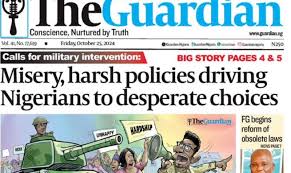The Presidency on Saturday faulted The Guardian newspaper’s lead story of Oct. 25, which had the title: “Calls for military intervention: misery, harsh policies driving Nigerians to desperate choices.”
Mr Bayo Onanuga, Special Adviser to the President, Information and Strategy, said in a statement that the story “openly incited unrest against President Bola Tinubu’s administration and advocated regime change under the guise of journalism”.
He said the inflammatory headline and content deviated from responsible reporting.
“The Guardian’s agenda was unmistakable from the cover illustration to the article.
“In attempting to create a balanced veneer, the author condemns military rule while fanning the flames of military intervention,” said Onanuga.
“This was evident in the introduction to the article,” he said.
The newspaper wrote: “Nigerians were exhilarated with the return of democracy in 1999, but 25 years on, the buccaneering nature of politicians, their penchant for poor service delivery, morbid hatred for probity, accountability, and credible/transparent elections, among others, are forcing some flustered citizens to make extreme choices, including calling for military intervention.
Continuing, the newspaper said, “Deep despondency permeates every facet of the polity consequent upon soaring cost of living.
“And while the political elite splurge on fine wines and exotic automobiles amid poor service delivery, calls for regime change could become more strident in the days ahead even though military insurrection holds no solution to the country’s woes.”
The Special Adviser said the newspaper must be questioned on how it could present an argument for military intervention while superficially denouncing it “unless it harboured a deliberate agenda”.
“This latest editorial reflects a troubling trend in which the publication has persistently propagated inflammatory and negative narratives, stepping dangerously close to undermining the very fabric of responsible journalism.
“Moreover, the lead story relies heavily upon emotive language and imagery—such as an illustration of military armoured tank—to bolster its argument while neglecting to present a balanced view.
“It indulges in lampooning the current administration while ignoring positive developments in Nigeria’s economic landscape. The report lacks empirical data and fails to exhibit the journalistic rigour that the situation demands,” Onanuga stated.
He said such narratives could embolden anarchists intent on disrupting the democratic process.
“Military rule is an anachronism in modern civilisations, irrespective of its framing, due to the oppressive nature typically associated with its practice.
“Guided by its experience in 1984, when two of its journalists were jailed by the military regime for reporting the truth, The Guardian acknowledges that military rule is terrible.
“Yet, it attempts to provoke public ire against President Tinubu by suggesting he governs with less regard for citizens than military dictators once did,” said Onanuga.
He said the narrative by the newspaper neglected the hard-fought battle that birthed the country’s democracy and served only to undermine the hard-won freedoms that Nigerians were enjoying.
“Good journalism is characterised by restraint and a commitment to national interest. Media outlets must propagate responsible reporting that contributes to an informed citizenry.
“During times of political and economic crises, the media, as a force for good, should rally the public around their leaders, fostering unity and patience as reforms are introduced,” Onanuga argued.
He explained that Tinubu had consistently called for understanding and patience amid the nation’s challenges.
“The President’s plea is not a sign of weakness but an affirmation of his dedication to a brighter future for Nigeria.
“Moreover, recent policy changes have initiated a turnaround, yielding positive economic indicators.
“According to the Minister of Finance and Coordinating Minister of the Economy, Wale Edun, the revenue-to-debt service ratio has notably declined from 97 per cent in 2023 to 68 per cent in 2024.
“Nigeria’s foreign reserves rose to 39.1 billion dollars on Oct. 22, with GDP growth achieving 2.98 per cent in Q1 2024—an increase from 2.31 per cent in Q1 2023,” stated Onanuga.
He said this growth was driven by sectors beyond oil, including the financial services sector, mining, and quarrying, marking a significant shift in the country’s economic structure.
“We are now exporting more than we are importing, with trade surpluses recorded in two consecutive quarters.
“In the light of the positive developments, it is unacceptable for any publication, including The Guardian, to incite calls for military intervention based on transient difficulties.
“A more cautious and responsible approach would have better served its readers and the nation,” he said.
According to him, journalism, like democracy, thrives on fairness and objectivity, a standard he says all media outlets must uphold.
“We encourage The Guardian and similar platforms to prioritise balanced reporting that fosters dialogue and understanding rather than division and unrest.
“At this time, we need our people and the media to rally around the government as the Tinubu-led administration steers our country through this challenging period toward a better future,” Onanuga said.

